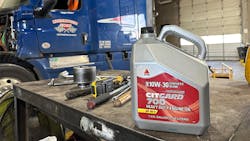Summer offers a chance to prioritize your fleet’s maintenance. Rising temperatures can impact your vehicles, causing engine oils to break down faster and grease to thicken or dry, reducing wear protection. This task is challenging for any fleet, but dealing with the diverse maintenance requirements of a mixed fleet can be a mixed bag. Learn how to effectively manage these unique challenges, such as selecting the right lubricants, with proper planning, expertise, and right resources.
As a mixed fleet operator, navigating the maintenance of your diverse vehicles and machinery can present several hurdles:
- Diverse equipment requirements: A mixed fleet generally involves vehicles and machinery from different manufacturers, each with specific engine and component specifications. This diversity in equipment will lead to managing various maintenance requirements such as engine oil viscosity, transmission fluid needs, regreasing intervals, performance ratings, and additive formulations.
- Compatibility issues: Using the wrong type of oil or grease can cause compatibility problems with your engines and machinery, impacting performance and potentially causing mechanical damage. It’s important to ensure compatibility across your various vehicles and equipment.
- Optimal performance: Different vehicle and equipment types may operate under varying conditions including temperature, load type, and operating hours. This may require varying specific formulations to maintain optimal equipment performance and longevity.
- Cost management: Handling multiple types of oils and greases for a mixed fleet can be costly. Balancing cost-effectiveness and performance is crucial to efficient fleet management. If your grease can not keep up with your oil drain interval extension, you may not see the full benefits of reduced maintenance.
To address these challenges proactively, it’s important to follow a structured approach:
- Understand your fleet’s requirements: Identify the different types of vehicles and equipment in your fleet (e.g. trucks, buses, construction equipment). Refer to your Original Equipment Manufacturer manuals and websites and check for recommended regreasing intervals and greases or required specifications for each type of vehicle and equipment. You can also contact your authorized service center or dealer for your vehicle or equipment.
- Consider operational conditions: The environment and conditions (extreme temperatures, dusty roads, heavy loads) in which your fleet operates can vary among equipment and vehicle types and can influence the choice of engine oil and grease. This will help prevent premature engine and equipment wear or failure, leading to longer engine and component life and reduced fleet downtime.
- Consider vehicles and equipment age and health: Choosing an engine oil that delivers the performance needed for newer engine designs while improving performance in older engines is key. Look for a heavy-duty product that delivers the performance needed for newer engine designs while improving performance in older engines. Premium API CK-4 heavy-duty engine oils like CITGO CITGARD 700 Synthetic Blend Heavy Duty Engine Oil SAE 10W-30 utilize a balanced Calcium and Magnesium detergent additive package to protect your engine and maintain your Diesel Particulate Filter life.
- Determine your lubricant properties:
- Viscosity grade: It’s important to choose the appropriate viscosity grade based on the OEM recommendations and the operating conditions of your vehicles and equipment. Different vehicles may require different viscosity grade oils. Lower viscosity engine oil use in heavy-duty applications is now an option due to increasing emissions standards and advancements in additives. The benefits of using lower viscosity oils include cost savings, improved engine durability, and flexible formulation. This can also be seen in the use of synthetics in transmission fluids and gear oils. Viscosity is also an important property in greases.
- Performance specifications: Ensure that the lubricants you are selecting meet certain performance specifications such as API service classifications and specific Original Equipment Manufacturer or OEM requirements
- Compatibility: Lubricants need to be compatible with different components and materials such as seals, gaskets, and bearings across your fleet. Using the wrong grease can lead to compatibility issues or accelerated wear.
- Streamlining maintenance: Using different lubricants can complicate maintenance schedules and procedures, inventory management, and training requirements.
- Utilize advanced tools and technology: Investing in advanced diagnostic and predictive tools and technology can streamline maintenance processes. These tools can help in quickly identifying issues, performing accurate diagnostics, and optimizing maintenance schedules. Preventative maintenance tools, like CITGO LubeAlert Fluid Condition Monitoring Service, can identify trends in a variety of equipment, providing valuable insights into equipment condition and conveniently helping to plan your vehicle's maintenance activities. LubeAlert makes fluid analysis simple by collecting data samples while in the field and submitting them using the LubeAlert mobile app or logging from a desktop. Using CITGO LubeAlert Fluid Condition Monitoring Service can help increase operational efficiency and production, and decrease maintenance costs and unexpected downtime, among other great benefits.
- Build vendor supplier relationships: Establishing strong relationships with your vendors and suppliers who specialize in parts and services for different lubricants and types of equipment can be beneficial. This can ensure timely access to maintenance expertise and technical support specific to each equipment type. Contact your supplier about choosing the right combination of heavy-duty engine oils and greases that will work together for your needs, such as the premium line of CITGO CITGARD HDEOs and Mystik Heavy Duty Grease, for your optimized mixed fleet operation.
While maintaining a diverse fleet requires careful planning and coordination, it also offers opportunities for flexibility and capability across various operational needs. By leveraging expertise and strategic management, you can navigate maintenance challenges effectively, ensuring optimal performance and efficiency across your fleet.
